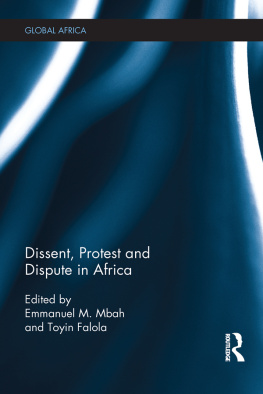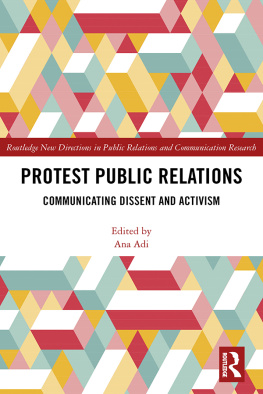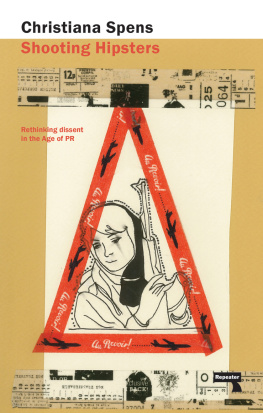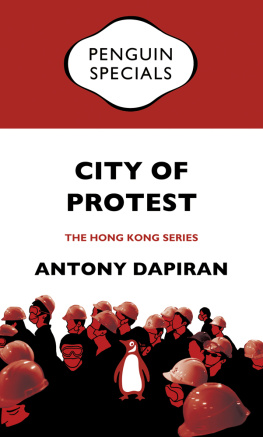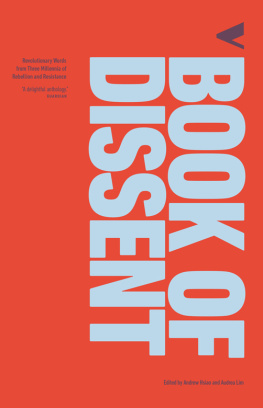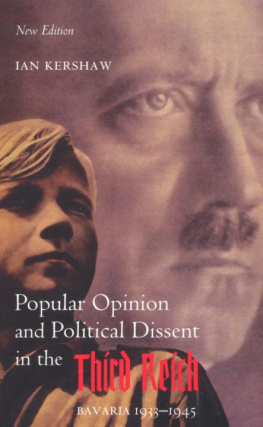
Filling a gap in the social science literature, Rob Watts engages in a powerful defence of the right to dissent, which is defined as fundamental given the irreducible pluralism of ideas in every society. Bridging social theory with empirical analysis of recent forms of criminalization of acts of resistance, he convincingly challenges the myth of liberal democracy as tolerant of disagreement and points at the complex and not always rational relations between fear, security and liberalism.
Donatella della Porta, Professor of Political Science and Political Sociology, European University Institute, ItalyRob Watts Criminalizing Dissent could not appear at a more important moment. In a careful, deliberate manner, he undertakes to explain not just what dissent is and the many forms it can take in liberal democracies, but also why it is so important that we protect it. This is a timeless lesson that seems especially relevant now.
Sophia Rosenfeld, Walter H. Annenberg Professor of History, University of Pennsylvania, USACriminalizing Dissent
While liberal-democratic states like America, Britain and Australia claim to value freedom of expression and the right to dissent, they have always actually criminalized dissent. This disposition has worsened since 9/11 and the 2008 Great Recession. This ground-breaking study shows that just as dissent involves far more than protest marches, so too liberal-democratic states have expanded the criminalization of dissent.
Drawing on political and social theorists like Arendt, Bourdieu and Isin, the book offers a new way of thinking about politics, dissent and its criminalization relationally. Using case studies like the Occupy movement, selective refusal by Israeli soldiers, urban squatters, democratic education and violence by anti-Apartheid activists, this book highlights the many forms that dissent takes along with the many ways in which liberal-democratic states criminalize it. The book also highlights the mix of fear and delusion in play when states privilege security to protect an imagined political order from difference and disagreement.
The book makes a major contribution to political theory, legal studies and sociology. Linking legal, political and normative studies in new ways, Watts shows that ultimately liberal-democracies rely more on sovereignty and the capacity for coercion and declarations of legal states of exception than on liberal-democratic principles. In a time marked by a deepening crisis of democracy, the book argues dissent is increasingly valuable.
Rob Watts is currently a professor of Social Policy at RMIT University where he teaches politics, criminology, policy studies and applied human rights. He was a founding member of the Greens Party in Victoria, and established the Australian Center for Human Rights Education at RMIT in 2008. His recent books include States of Violence and the Civilising Process (2016), Public Universities, Managerialism and the Value of the University (2017) and The Precarious Generation: A Political Economy of Young People (2018, co-authored).
The Criminalization of Political Dissent
Series editor: Professor Judith Bessant, RMIT University, Melbourne, Australia
This challenging new book series explores the way governments since 9/11 from across the political spectrum intensified their efforts to criminalize both traditional and new forms of digital political dissent. The series will feature major contributions from the social sciences, law and legal studies, media studies and philosophy to document what happens when governments choose to regard activists campaigning for increased government transparency and accountability, environmental sustainability, social justice, human rights and pro-democracy as engaging in illegal activities.
The book series explores the legal, political and ethical implications when governments engage habitually in mass electronic and digital surveillance, outlaw freedom of movement real and virtual public assembly and prosecute digital activists. The books in this series are a must read for anyone interested in the future of democracy.
Governing Youth Politics in the Age of Surveillance
Edited by Maria Grasso and Judith Bessant
Shooting the Messenger
Criminalising Journalism
Andrew Fowler
Criminalizing Dissent
The Liberal State and the Problem of Legitimacy
Rob Watts
For more information about this series, please visit: https://www.routledge.com/The-Criminalization-of-Political-Dissent/book-series/CRIMPD
Criminalizing Dissent
The Liberal State and the Problem of Legitimacy
Rob Watts
First published 2020
by Routledge
2 Park Square, Milton Park, Abingdon, Oxon OX14 4RN
and by Routledge
52 Vanderbilt Avenue, New York, NY 10017
Routledge is an imprint of the Taylor & Francis Group, an informa business
2020 Rob Watts
The right of Rob Watts to be identified as author of this work has been asserted by him in accordance with sections 77 and 78 of the Copyright, Designs and Patents Act 1988.
All rights reserved. No part of this book may be reprinted or reproduced or utilised in any form or by any electronic, mechanical, or other means, now known or hereafter invented, including photocopying and recording, or in any information storage or retrieval system, without permission in writing from the publishers.
Trademark notice: Product or corporate names may be trademarks or registered trademarks, and are used only for identification and explanation without intent to infringe.
British Library Cataloguing-in-Publication Data
A catalogue record for this book is available from the British Library
Library of Congress Cataloging-in-Publication Data
A catalog record has been requested for this book
ISBN: 978-1-138-48871-7 (hbk)
ISBN: 978-1-351-03958-1 (ebk)
Typeset in Goudy
by codeMantra
Dedicated to Marion Harper and Peter Abrehart of the Unitarian Peace Memorial Church of East Melbourne and to Ambrose and Sebastian.
This book has taken a long time to write, partly because there were some fundamental and difficult problems involved in understanding dissent as political to say nothing of the effort involved in making sense of the attempts by liberal-democratic states to suppress those activities.
I would like to acknowledge first the intellectual assistance rendered by a former student of mine, Bao Huynh, who did some fundamental research and who helped me with some thinking as well, at a time when I needed an extra brain and an extra pair of eyes. I should also acknowledge the fact that my current academic boss Dr Michele Ruyters helped out at the right time with financial support that enabled me to pay Bao for his work.
That I continue to enjoy teaching, and the practices of enquiry and writing that nourish my teaching, has a lot to do with working with younger colleagues like James Rowe and Kara Sandri. Like other canny outlaws in the new dark ages into which many universities have plunged themselves into, we work together to refuse the bizarre and chilling effects produced by the inane, crass, corporate gibberish now imposed by the leaders of our universities who strive to inhibit the capacity of good teachers to inspire and promote the loving practices of critical thinking, creative enquiry and the courage to engage in good judgement, which is what universities exist to do.




